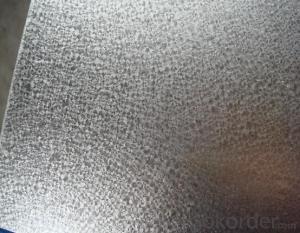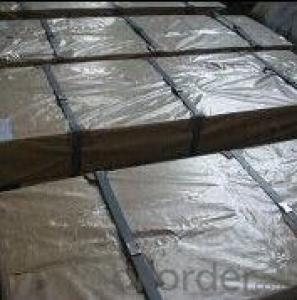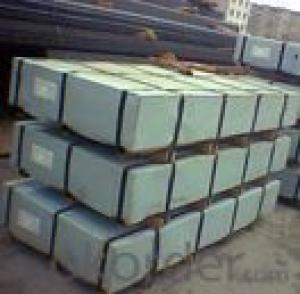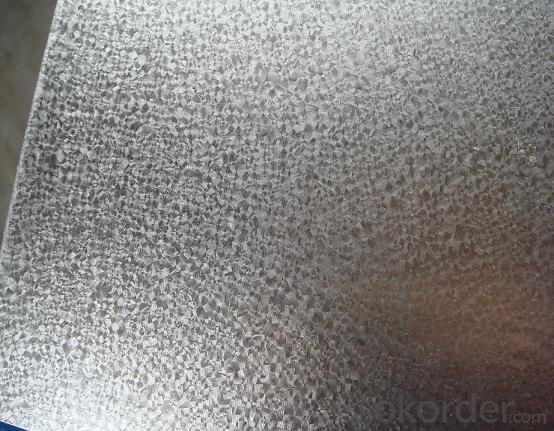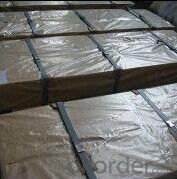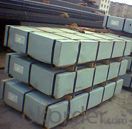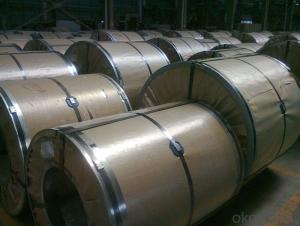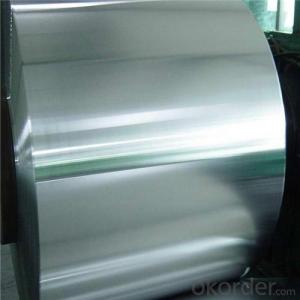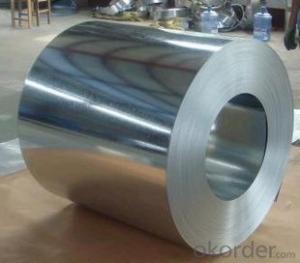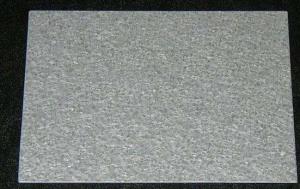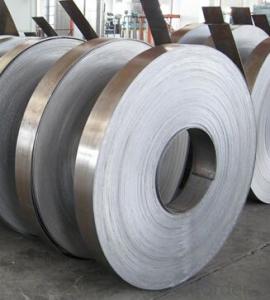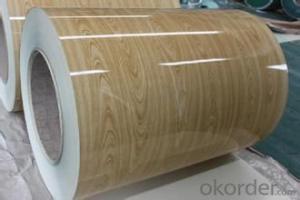Hot Dip Aluzinc Steel Sheet with High Quality
- Loading Port:
- Tianjin
- Payment Terms:
- TT OR LC
- Min Order Qty:
- 25 m.t.
- Supply Capability:
- 10000 m.t./month
OKorder Service Pledge
OKorder Financial Service
You Might Also Like
1. Description of the Hot Dip Aluzinc Steel Sheet with High Quality Description:
Hot-dip aluzinc steel structure is composed of aluminum-zinc alloy, consisting of 55% aluminum, 43% zinc and 2% at 600 ℃ silicon solidification temperature and composition, the entire structure is made of aluminum - iron - silicon - zinc, to form a dense quaternary crystals an alloy. The characteristic spangled silver colour of Aluzinc gives it a very attractive appearance. Thanks to a thin transparent layer of aluminium oxide on the top surface of the coating, this appearance is preserved over time.
Hot-dip aluzinc steel has many excellent features: strong corrosion resistance, is three times the pure galvanized sheet; zinc surface with beautiful flowers, can be used as a building outside board.
Applications of hot-dip aluzinc steel:
1)Building: roof, walls, garages, soundproof walls, pipes and modular housing.
2)Automotive: muffler, exhaust pipes, wiper accessories, fuel tank, truck boxes, etc.
3)Appliances: refrigerator back, gas stove, air conditioners, microwave oven, LCD frame, 4)CRT-proof band, LED backlight, electrical cabinets, etc.
5)Farm: barn, sheds, silos, piping and other greenhouse.
6)Other: breaking heat insulation cover, heat exchangers, dryers, warm water, etc.
2.Main Features of the Hot Dip Aluzinc Steel Sheet with High Quality:
• Excellent corrosion resistance
• High temperature oxidation resistance
• High hot reflectance
• Good manufacturability
•Beautiful appearance
•Surface coating
•Cost-effective
3.Hot Dip Aluzinc Steel Sheet with High Quality Images
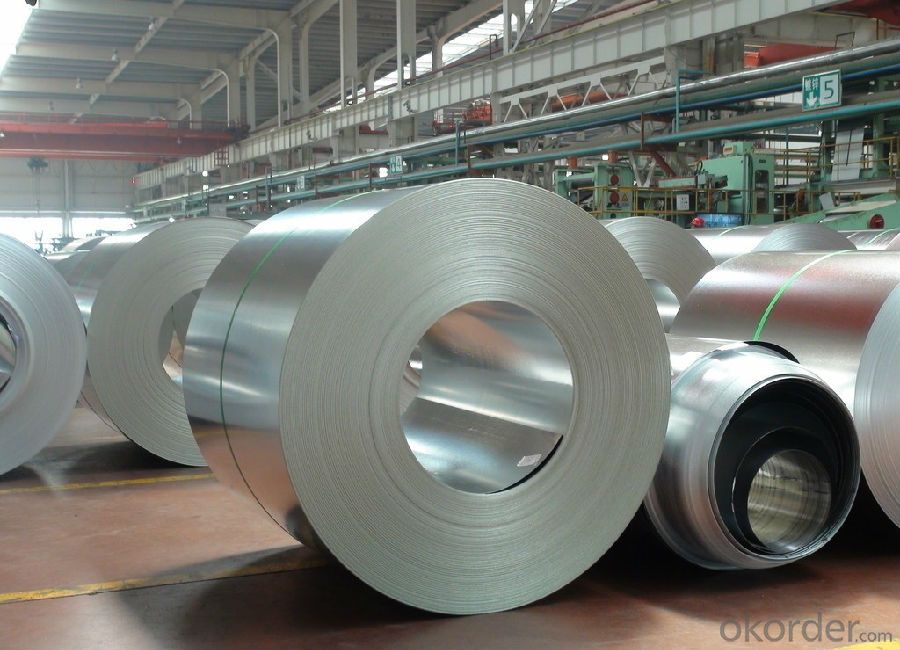
4.Hot Dip Aluzinc Steel Sheet with High Quality Specification
AVAILABLE SPECIFICATION
HOT-DIP ALUZINC STEEL COILS | |
THICKNESS | 0.16mm-3.5mm |
WIDTH | 1250mm MAX |
COATING MASS | 30g/ m2-185 g/ m2 |
SPANGLE | Regular Spangle, Minimized Spangle, Zero Spangle |
SURFACE TREATMENT | Chromated / non-chromated, Oiled / non-oiled, Anti Finger Print |
COIL INNER DIAMETER | 508mm or 610mm |
HOT-DIP ALUZINC STEEL COILS | |||
COMMERCIAL QUALITY | ASTM A792M-06a | EN10327-2004 | JIS G 3321:2010 |
STRUCTURE STEEL | SS GRADE 230 SS GRADE 255 SS GRADE 275 SS GRADE 340 SS GRADE 550 | S220GD+AZ S250GD+AZ S280GD+AZ S320GD+AZ S350GD+AZ S550GD+AZ | SGLC400 SGLC440 SGLC490 SGLC570 |
5.FAQ of Hot Dip Aluzinc Steel Sheet with High Quality:
We have organized several common questions for our clients,may help you sincerely:
1.What advantages does your company have?
Cement : Annual capacity of 400 million tons, No. 1 in the world
Fiberglass: Annual capacity of 1 million tons fiberglass, No. 1 in the world.
Composite Materials — Carbon Fiber: Annual capacity of 10,000 tons PAN precursor and 4,000 tons carbon fiber, No. 1 in China
Composite Materials — Rotor Blade: Annual production capacity of 15,000 pieces, No.1 in China, Top3 worldwide
Glass: CNBM owns about 20 modern float glass product`ion lines, With annual capacity of 10 million square meters glass.
Light Weight Building Materials: Annual capacity of 1.65 billion square meters of gypsum board, No. 1 in the world.
Commercial concrete: Annual capacity of 0.35 billion cubic meters, No. 1 in the world.
Refractory Material: Annual capacity of 40,000 tons casting refractory, No.1 in the world.
2.What advantages do your products have?
Firstly, our base material is of high quality, Their performance is in smooth and flat surface,no edge wave ,good flexibility.
Secondly, high quality zinc ingoats, 97.5% zinc,1.5% silicon,1% others, the same zinc coating measured by metal coating thickness or by zinc weight
Thirdly, high precision: Tolerance strictly according to ASTM or JISG standard even more rigid.
We have full stes of testing equipment(for t best, cupule,chromatism,salt spray resistance, etc) and professional engineers.
3.Could you let me approach about your company in Dubai?
Located at Jebel Ali Free Zone in Dubai, CNBM Dubai Logistics Complex is adjacent to -Jebel Ali sea port-the largest port in UAE and Al Maktoum Airport-the largest airport in the world, which covers an area of 50,000 square meters, including an fully enclosed warehouse by 10,000 square meters, an open yard by 25000 square meters, and 13 standard unloading platform. CNBM Dubai Logistics Complex formally put into operation on August 1, 2013. Dubai Logistics Complex will commit itself to build the most professional and most influential building materials distribution center of China’s building materials industry in the UAE and throughout the Middle East and Africa.
- Q: What are the different types of steel coils available?
- There exists a variety of steel coils, each possessing distinct characteristics and uses. 1. Hot Rolled Steel Coils: These coils undergo production at high temperatures and are ideal for applications requiring a sleek and polished finish, such as automotive components, construction materials, and machinery. 2. Cold Rolled Steel Coils: In order to enhance surface finish and dimensional accuracy, these coils are processed at lower temperatures. They find extensive use in industries like automotive, appliances, and electronics, where precision is of utmost importance. 3. Galvanized Steel Coils: A layer of zinc is applied to these coils to safeguard the underlying steel against corrosion. They are commonly utilized in the construction sector, roofing, and automotive parts that are exposed to harsh environmental conditions. 4. Stainless Steel Coils: Created by combining iron, chromium, and other elements, these coils offer exceptional resistance to corrosion and possess high strength. They are widely employed in applications demanding hygiene, such as food processing equipment, medical instruments, and kitchen appliances. 5. Electrical Steel Coils: Specifically designed for applications requiring magnetic properties, these coils are utilized in transformers, electric motors, and generators. They exhibit low core losses and high permeability, ensuring efficient transfer of electrical energy. 6. Pre-painted Steel Coils: These coils are coated with paint or other protective coatings to enhance their visual appeal and provide additional protection against corrosion. They are commonly used in the construction industry for cladding, roofing, and siding. 7. Tinplate Steel Coils: A thin layer of tin is applied to these coils to prevent corrosion and act as a barrier against moisture and oxygen. They find widespread usage in the packaging industry for cans, containers, and other food or beverage packaging. These examples merely scratch the surface of the various steel coil options available in the market. Each variant possesses its own unique properties and applications, rendering them suitable for diverse industries and purposes.
- Q: What are the different types of surface defects in steel coils?
- There are several different types of surface defects that can occur in steel coils. Some common examples include scratches, pits, scale, rust, and roll marks. Additionally, there can be issues such as waviness, edge cracks, and oil stains. These defects can affect the quality and appearance of the steel, and it is important to properly identify and address them during production and inspection processes.
- Q: I am a beginner (never played before!) and I am going to try to teach myself since I think it is a lovely instrument. I am fourteen-years-old so I am not 'adult-size', haha. Anyway, what is difference between nylon strings and steel strings?Thanks :)
- Small guitars easier to find in classical range. I assume their must be small steel strings but not seen them.
- Q: What are the different types of steel coil coatings for corrosion resistance?
- There are several types of steel coil coatings available for corrosion resistance, including galvanized coatings, galvannealed coatings, and organic coatings.
- Q: How are steel coils used in the manufacturing of automotive chassis?
- Steel coils are used in the manufacturing of automotive chassis as they are shaped and formed into various structural components such as frame rails, cross members, and support beams. These coils are cut, bent, and welded together to create a strong and rigid chassis structure, providing the necessary strength and stability for the vehicle.
- Q: What are the typical coil thickness options?
- The typical coil thickness options vary depending on the specific application and industry. However, common coil thickness options range from 0.005 inches to 0.250 inches (0.127mm to 6.35mm), with various intermediate thicknesses available.
- Q: What processes and materials are used in the production of chrome steel
- Go to the process section and find point 6 (explains when alloys are added). Chrome is added at this point, usually in the form of ferrochrome alloy (FeCr). Many kinds of chrome steel also contain nickel. The strengthening effect on steel by forming stable carbide grains at the grain boundaries and the strong increase in corrosion resistance made chromium an important alloying material for steel. The high speed tool steels contain between 3 and 5% chromium.
- Q: What are the factors to consider when selecting a supplier for steel coils?
- There are several factors to consider when selecting a supplier for steel coils. 1. Quality: The supplier's reputation for providing high-quality steel coils is crucial. The steel coils should meet industry standards and have consistent quality to ensure the durability and performance of the final product. 2. Reliability: It is important to choose a supplier that can consistently meet your demand for steel coils. They should have a proven track record of on-time delivery and the ability to handle large orders efficiently. 3. Cost: The pricing of steel coils is a significant factor to consider. While it is essential to find a supplier that offers competitive prices, it is equally important to ensure that the quality is not compromised. Comparing prices from multiple suppliers is advisable to find the best balance between cost and quality. 4. Range of Products: Look for a supplier that offers a wide range of steel coil products. This ensures that you have various options to choose from and can find the exact specifications and dimensions that meet your requirements. 5. Technical Expertise: A supplier with technical expertise and experience in the steel industry can provide valuable advice and assistance in selecting the right steel coils for your specific needs. They can also help with any customization or special requirements you may have. 6. Location and Delivery: Consider the supplier's location and their ability to deliver steel coils to your desired location. Choosing a supplier who is geographically closer to your facility can help reduce transportation costs and lead times. 7. Customer Service: A supplier who values good customer service is always preferable. They should be responsive to your inquiries, provide timely updates, and be willing to address any issues or concerns that may arise. By considering these factors, you can make an informed decision and choose a supplier that best meets your requirements for steel coils.
- Q: How are steel coils protected from extreme weather conditions?
- Steel coils are typically protected from extreme weather conditions using various methods such as covering them with waterproof wraps, storing them in climate-controlled warehouses, or applying anti-corrosion coatings. These measures ensure that the coils are shielded from moisture, temperature fluctuations, and other environmental factors that could potentially damage or degrade the steel.
- Q: What are the different types of steel coil surface treatments for outdoor applications?
- For outdoor applications, there are several commonly used surface treatments for steel coils that enhance durability, corrosion resistance, and appearance. Examples of these treatments include: 1. Galvanized: This treatment involves applying a layer of zinc to the steel surface, providing excellent corrosion resistance. Galvanized steel coils have a shiny, silver appearance. 2. Galvalume: Galvalume is a combination of aluminum and zinc applied to the steel surface, offering superior corrosion resistance compared to galvanized steel. Galvalume steel coils have a duller, matte finish. 3. Painted: Steel coils can be painted with various coatings to enhance appearance and protect against corrosion. The paint can be applied in single or multiple layers, depending on the desired level of protection. Painted steel coils are available in a wide range of colors and finishes. 4. Powder Coated: This type of paint coating is applied as a powder and then cured under heat, resulting in a durable and long-lasting finish. Powder coated steel coils are resistant to chipping, scratching, and fading, making them suitable for outdoor applications. 5. Organic Coated: Organic coatings, such as PVC or PVDF, are applied to steel coils to provide additional protection against corrosion and weathering. These coatings are commonly used in architectural applications where aesthetics and durability are important. These various surface treatments for steel coils offer different levels of protection and aesthetic options for outdoor applications. The choice of treatment depends on factors such as the intended use, environmental conditions, and desired appearance.
Send your message to us
Hot Dip Aluzinc Steel Sheet with High Quality
- Loading Port:
- Tianjin
- Payment Terms:
- TT OR LC
- Min Order Qty:
- 25 m.t.
- Supply Capability:
- 10000 m.t./month
OKorder Service Pledge
OKorder Financial Service
Similar products
Hot products
Hot Searches
Related keywords
